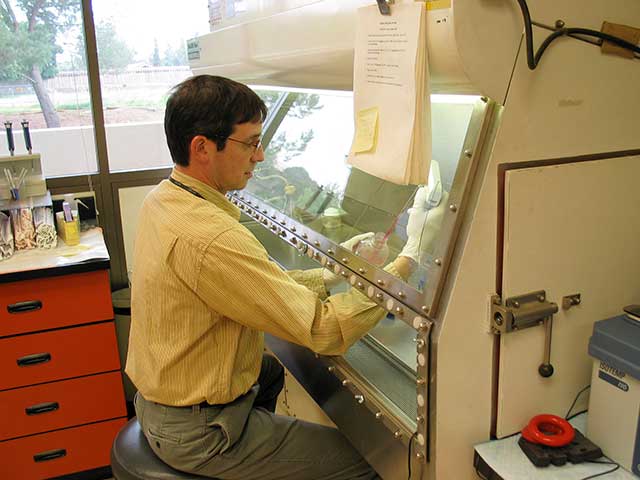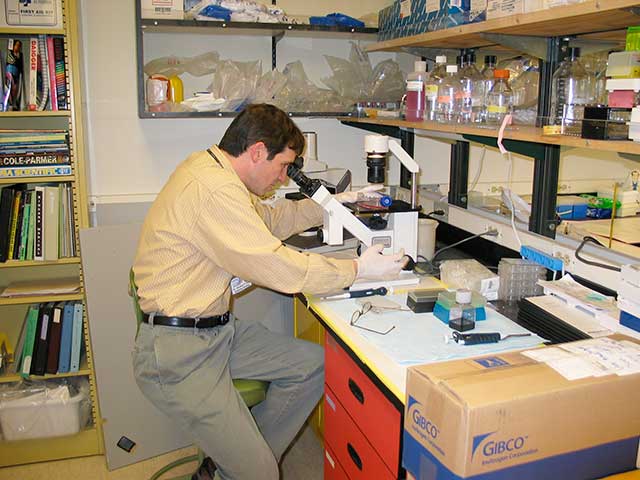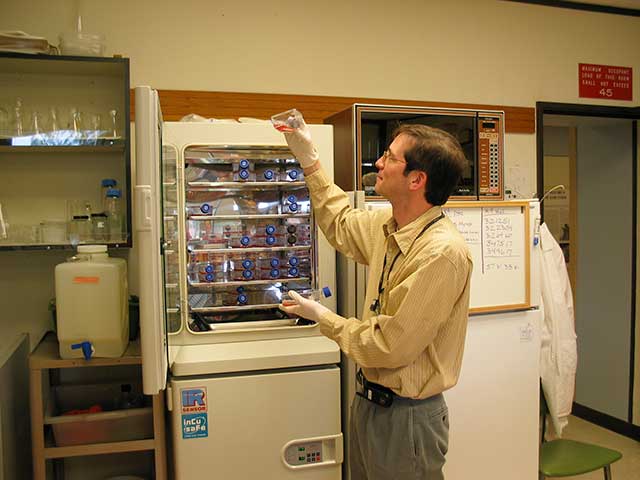Become a Researcher!




This might make an interesting scene for a science-fiction movie. But it is not at all what it is like being a real scientist. Just ask Dr. Michael Kent. He is a veterinary researcher at the University of California at Davis.
Yes, he does spend time alone in his lab. As he puts it, "There are days when you are onto something really interesting and you just work in the lab." But most of the time, Dr. Kent's job has much more variety. "As a researcher, no two days are ever the same!" Dr. Kent says.
Even when Dr. Kent spends time in the lab, he is not just doing it to mix chemicals together. He is doing it to learn more about dogs, so he can help dogs have happier and healthier lives.
Dog "Patients" and Their Human Families
Dr. Kent devotes a lot of his time to meeting and getting to know lots of different dogs. He calls these dogs his "patients." They are his inspiration for becoming a researcher. "Whether I'm in the lab, or whether one of my patients is sick, I have to figure out a problem," Dr. Kent says. "It's a big puzzle, and I have to put all the pieces together to help my patients. This makes my work very interesting."
One piece of that puzzle is checking the dog's health, like a doctor. Dr. Kent also gets information about the dog's history. To do that, Dr. Kent listens to what the dog owners tell him. This gives him a couple of pieces to the puzzle. Then he is ready to work in the lab. Perhaps he looks at something under a microscope. Maybe he does some reading about the dog's illness. He might speak to another researcher, to share opinions.
Dr. Kent takes everything he learned in the lab and pieces it together with the information he heard from the owners. Now Dr. Kent has a plan, and he is ready to treat the dog. But first he meets with the dog's owners again. Dr. Kent tells the owners what he discovered in the lab and why he thinks his plan will help their dog. The owners are the ones who decide what to do for their dog, so all the scientific knowledge in the world cannot help a dog unless the owners see why it is important.
Dr. Kent's goal now is to help the owners understand the science, so they are more likely to follow his advice. To to that, he tries to make the owners feel comfortable about everything he is telling them. "I want people to know what we're doing is safe," Dr. Kent explains, "and that we would never do any harm to the dogs. Researchers have to be able to talk to families so they see this. Without that, you can't make good use of the science."
Veterinarians of the Future
Dr. Kent has another mission. It takes place in classrooms with hundreds of students. "One of the most exciting parts of being a researcher is teaching veterinary students," he says. "These are the young people who will one day treat animals. They take my ideas and go even further than I do."
When Dr. Kent was a kid, he loved dogs and cats. He was also fascinated about what makes things work. He puts those two ideas together as a researcher. "When I was in school, I realized that the only way we'll ever find causes of diseases, and fix them, is to do research. I wanted to be one of those people who figures out how to fix them."
This is an exciting time for kids who love dogs and want to become researchers. There are many new discoveries to be made in the future, and kids are the ones who will do it. It used to just be boys who studied science. "But now there are so many more girls interested in veterinary science," Dr. Kent says. "That's really great."
If you think being a researcher sounds exciting, here is a suggestion. Go on the Web, and search for "veterinary college." There are 28 veterinary colleges in the United States. Most of them offer free tours. Kids come to the college, speak with the researchers, ask questions, and get an idea of what it might be like to study there. "You can check the colleges out and decide which one you like most," Dr. Kent explains.
You don't have to wait until you are college age to do a tour. Dr. Kent often meets with young people who are considering going to the University of California. This is another exciting part of being a researcher!
Always Learning
There is one more interesting part of being a researcher. Many times during the year, researchers gather together in big meetings called conferences. These take place around the world. During conferences, researchers discuss new discoveries for helping dogs – their patients. "You get to tell people about your work, and you hear about their work," Dr. Kent says. "That way, we all advance the science even more."
Being a researcher is a satisfying job. To get there, you have to work hard. "For kids who want to go to vet school, it's important to spend time reading and learning," Dr. Kent advises. "Keep your grades up. But don't just memorize things. Learn what it all means and think about solving problems. That's the first step towards becoming a researcher."
All that hard work is worth it. "When I have patients who are sick," Dr. Kent says, "and I do something that makes them better, those are the best moments in my life. That's exactly why we do research – so patients can go home healthy and be together with their families."
